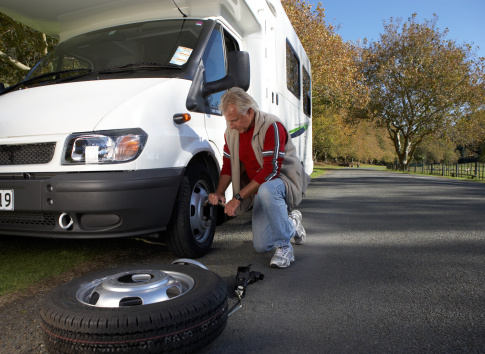Have questions about your RV’s tires? Wondering if other RVers have the same concerns? Hesitant to ask your tire dealer?
Remember: Before purchasing any tire, be sure to check the age code on the tire’s sidewall. It is important that new tires be truly “new.” It is the actual date of manufacture that is important, even though the warranty time typically begins at the time of installation.
It is highly recommended to have your RV properly weighed using individual scales by an accredited RV entity such as the RV Safety and Education Foundation (RVSEF). RVSEF provides this weighing service at most FMCA RV Expos .
By weighing each individual tire, you can determine if a side of the RV is exceeding a tire or axle rating. An RV can appear to be sitting level but can be out of balance in terms of weight. If this is the case, look for items that you can move to help distribute the weight. Every item packed in your RV adds up!
Another cause for uneven tire wear could be what’s called “spring sag.” When vehicles remain loaded over a period of time, the springs can be affected. For instance, if a trailer has had a 500-pound higher load on one side for several years and many miles, it would lead to uneven tire wear. However, this is not a difficult or expensive issue to address; simply have new springs installed and adjust your RV’s load to prevent future issues.
Can I swap LT tires with ST tires, or vice versa, on my travel trailer?
For passenger tires (including LT tires), ride, traction, and handling are the key design elements and are achieved primarily by adding flex to the tire’s sidewall. This maximizes tread contact with the road, thus increasing traction and allowing the driver to maintain better control over the vehicle.
However, sidewall flexing is not a desired effect because it can cause trailer sway. The stiffer sidewalls and higher operating pressures common with ST tires help control and reduce the occurrence of trailer sway.
It is important to match the tires to the application and payload. Since ST tires are constructed with heavier materials, they are tougher and more bruise-resistant than typical passenger car tires. This is a plus because trailer suspension systems are generally stiffer and less sophisticated than automotive suspension systems. A tire designed to operate in the more demanding trailer environment will provide longer service life and be able to withstand added abuse.
The bottom line: trailers are more stable and pull better on tires designed specifically for trailer use, so it recommended to switch to the ST type.
Should something be used to separate my tires from the ground while parked to help extend tire life?
Protecting your tires during periods of non-use will help preserve and protect the rubber. Though wooden blocking is commonly used, we also suggest placing a separation between the wooden blocks and the tires to avoid excessive moisture and/or heat build-up. Plastic, web-like blocks are readily available in the aftermarket. Look for a type that will drain and not trap moisture.
I’ve heard the sun can damage my RV’s tires. Is that true?
The effect of unprotected UV exposure on rubber includes cracking, discoloration, and lack of physical mechanical properties. Tire makers use a carbon substance to combat the effects of UV radiation. Contrary to what some suppliers may say, there is no such thing as a permanent UV protector. However, here are a few ideas to help extend tire life:
Keep RV tires clean. Avoid heavy build-up of mud, sand, or dirt. Dirt on tires may act as an abrasive of sorts that could inhibit the natural wax protection achieved through normal tire flexing. Wash your tires regularly with mild, soapy water and a soft brush.
Inspect the tires regularly.
Inflate the tires to the exact requirement based on the actual weight of that tire position.
During short periods of non-use, keep the tires completely covered. When possible, remove and store the tires completely out of the sun and temperature extremes.
Regularly apply a non-petroleum-based preservative to all surface areas of each tire.
Purchasing quality tires and, thus, maintaining your tires will lead to safer and more fun RV trips. Always take the time to do your tire research to keep your rig rolling!
FMCA RV Club brings you this monthly tech tip to Enhance Your RV Lifestyle. FMCA delivers RV know-how to its members. Learn more at FMCA.com.





